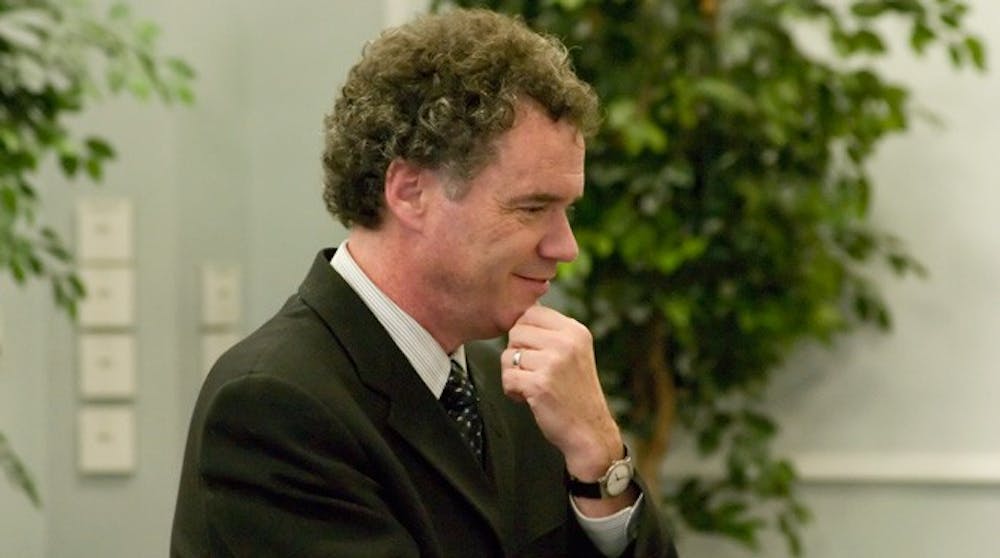Friday afternoon, Edward Ayers announced that he would be stepping down as president of University of Richmond after the 2014-15 academic year.
Ayers wrote in a campus wide email that the completion of The Richmond Promise and the Fulfilling the Promise campaign provided a natural conclusion to his term.
Ayers will officially step down June 30, 2015.
Promoting access, affordability, diversity and inclusion are the core values identified by The Richmond Promise campaign. Its enactment has guided the development of the university, and its completion will accompany Ayers' eighth and final year as president.
Ayers' announcement came after several campus controversies including the decision last year to cut the men's soccer and track programs and establish a men's lacrosse team. Shortly after the decision, longtime Richmond supporter Bobby Ukrop resigned from the board of trustees.
The most recent controversy began over two weeks ago when trustee Paul Queally's sexist and homophobic comments were quoted in New York Magazine.
At a forum held last week in response to Queally's comments, Ayers choked back tears when he stood and addressed the group for the final comment of the night.
"It is humbling to see that no matter how hard we work, what we have built can be damaged quickly," Ayers said. "But I hope it can be healed quickly as well. We can't lose the work that all the people in this room have been doing. I'm grateful for your patience, and I'm grateful for your impatience as well."
Three days after the forum, Ayers announced his resignation, but Joseph Boehman, dean of Richmond College, said the Queally controversy and Ayers' announcement were in no way connected.
Ayers confirmed in an email that his resignation was not connected to the controversy, according to Richmond Times-Dispatch.
Boehman said the soccer and track cuts last year had upset certain people, but that it was a decision made by the board of trustees and part of the president's role was to carry out those decisions.
"You can't be a leader for any length of time and not do something that's going to upset someone," Boehman said. "And there are times as a leader that you have to be the face of an unpopular decision."
Enjoy what you're reading?
Signup for our newsletter
The controversies during Ayers' tenure have mostly occurred in the last year, and Boehman said a president's legacy should not be defined by isolated situations.
"I think if people are wanting to create Dr. Ayers' legacy based on a couple of actions, people are going to do that but I think it's very short-sighted," Boehman said. "Any way you want to look, the university has improved. My hope is that most people in the long view will look at that and say, 'he was an excellent president for this university.'"
Steve Bisese, vice president for student development, said he was sad when he learned about Ayers' resignation, but happy that Ayers would be able to continue with his passions as a historian and teacher.
"He's the best boss I've ever had," Bisese said. "He's one of those guys that was able to influence all areas of the university--academically, athletics, student development, advancement, admissions. ... You can look to his stint here in eight years and see he's positively affected all areas of the university."
Shortly after Ayers' announcement, Charles Ledsinger, rector of the university's board of trustees, sent a campus-wide email on behalf of the board. Ledsinger wrote that Ayers made the announcement before the board on Friday.
"As you can imagine," Ledsinger wrote, "the board accepted his decision with disappointment, but also with deep gratitude for his outstanding leadership over the past seven years."
The board's message highlighted some of the most noteworthy achievements of Ayers' tenure, including the nearly 50 percent undergraduate application growth and the 114 percent increase of U.S. students of color in the entering class.
The board will launch a search committee this summer to help identify Ayers' successor, according to Ledsinger's email. The committee will have representation from faculty, staff, students and alumni, and the search is expected to begin in the fall.
After announcing his own resignation in October, Steve Allred, provost and vice president for academic affairs, said he wasn't shocked or surprised by Ayers' resignation.
"Ed is a scholar," Allred said, "and I know that he is dedicated to scholarly work--to writing, to teaching, to digital scholarship...and I know that it's important to him to be able to continue that work. It's what he loves to do."
Ayers was a professor at University of Virginia while Juliette Landphair, dean of Westhampton College, was a graduate student there. Landphair earned her doctorate in Southern history, and began her professional relationship with Ayers as a graduate student.
Part of Ayers' vision as president extended naturally from his academic approach as a historian, Landphair said.
"He's able to talk about the shadows of the past as well as the great lights of the past," Landphair said. "In looking forward and thinking about how do I make us more inclusive, accessible and affordable, let's look to the past and build on the progressive themes of what has made this place, and he's done that so successfully."
Contact staff writer Clay Helms at clay.helms@richmond.edu
Support independent student media
You can make a tax-deductible donation by clicking the button below, which takes you to our secure PayPal account. The page is set up to receive contributions in whatever amount you designate. We look forward to using the money we raise to further our mission of providing honest and accurate information to students, faculty, staff, alumni and others in the general public.
Donate Now


